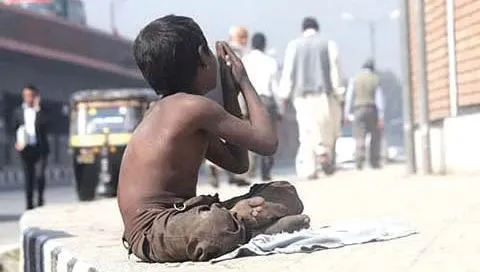Beginning can manifest in two distinct ways: one where individuals choose to pursue a path of starting anew voluntarily, and the other where they are compelled to begin due to various circumstances beyond their control.
By Qysar ul Islam Shah
Begging is a pervasive social issue characterized by individuals soliciting alms or other forms of assistance from others with minimal or no expectation of reciprocation. This practice manifests in two primary forms: one where individuals voluntarily choose to beg, and another where they are coerced into begging due to various underlying circumstances.
Recently, I had the opportunity to observe the numerous beggars engaging with commuters in the crowded markets of Kupwara and the bustling capital city. Among them, the sight of young children, extending their small hands and pleading for alms, was particularly poignant and stirred my emotions deeply.
Amidst these growing challenges, the Ministry of Social Justice and Empowerment has initiated support for marginalized individuals through the broader scheme known as SMILE (Support for Marginalized Individuals for Livelihood and Enterprise). This initiative includes various sub-schemes and a central sector scheme designed for the comprehensive rehabilitation of those involved in begging. The SMILE scheme provides extensive coverage, including medical facilities, counseling, educational opportunities, and economic linkages.
In response to this pressing issue, the government has launched a comprehensive program called “Bhiksha Mukt Bharat,” which aims to eliminate begging in India by 2026. However, a recent increase in the presence of beggars near Jami Masjids, traffic junctions, public places, parks, banking outlets, and markets has necessitated the introduction of new campaigns to address and eradicate this problem.
Begging is often associated with poverty, defined as the act of soliciting or receiving alms in public spaces due to a lack of visible means of subsistence. This issue is particularly acute in busy intersections and urban centers. In Kashmir, for instance, cities like Batmalo and Lalchowk experience high levels of begging, with children frequently coerced into this practice by their parents or human traffickers for financial gain.
From an Islamic perspective, the faith emphasizes self-reliance and the importance of earning one’s living rather than seeking charity without cause. Begging is deemed undesirable in Islam, permissible only in dire circumstances. The Prophet Muhammad (SAW) conveyed the principle of generosity by stating that even if a person requests assistance while wearing two gold bracelets, one should not refuse to offer help.
It is often observed that some individuals living in poverty may exaggerate their destitute conditions in an effort to preserve their dignity. In such cases, they strive to protect their self-respect, even when receiving assistance offered in a subtle and courteous manner. For those whose property has been destroyed by a calamity, begging may be deemed permissible until they obtain sufficient support to sustain themselves or achieve reasonable subsistence.
In essence, every member of society should aim to be productive and refrain from soliciting money or property from others. Begging not only has detrimental effects on the individual who begs—such as a loss of dignity and social acceptability—but also impacts their ability to engage in regular employment. This issue has become a significant concern, weaving its way through the fabric of society and affecting communities at large.
The views expressed in this article are solely those of the author and do not necessarily reflect the opinions or views of this Magazine.
Blurb
From an Islamic perspective, the faith emphasizes self-reliance and the importance of earning one’s living rather than seeking charity without cause. Begging is deemed undesirable in Islam, permissible only in dire circumstances.

Leave a Reply